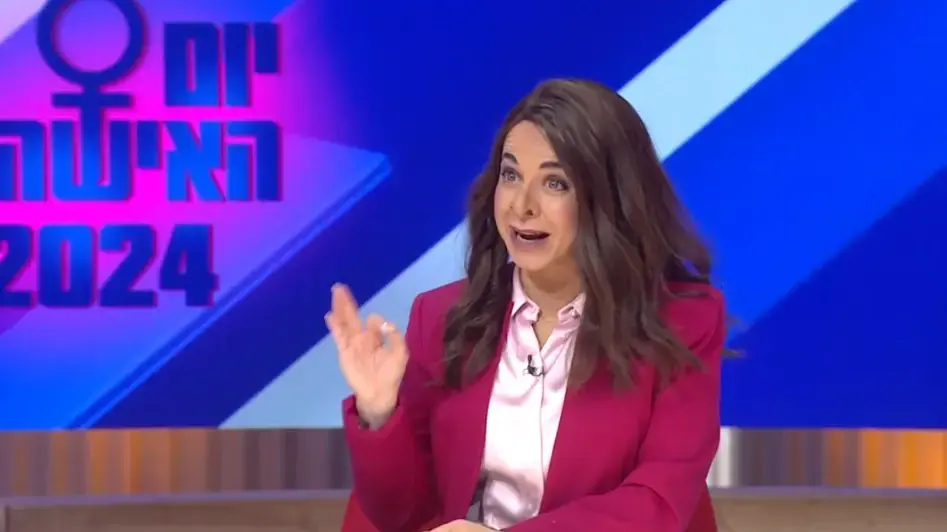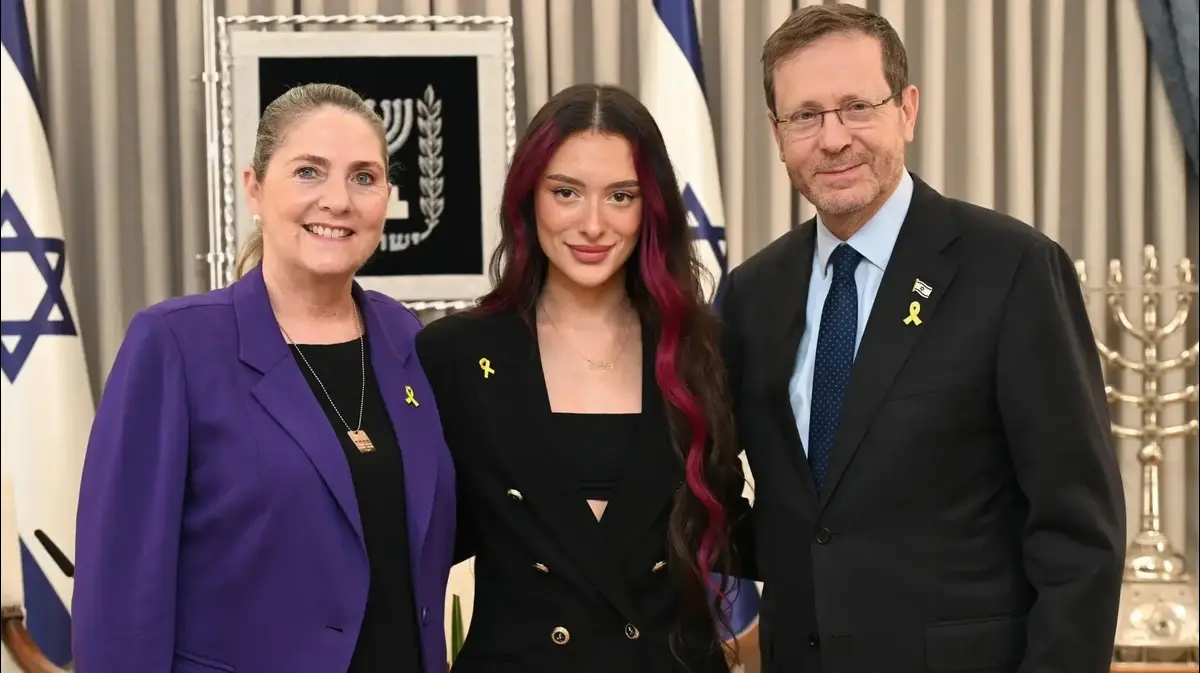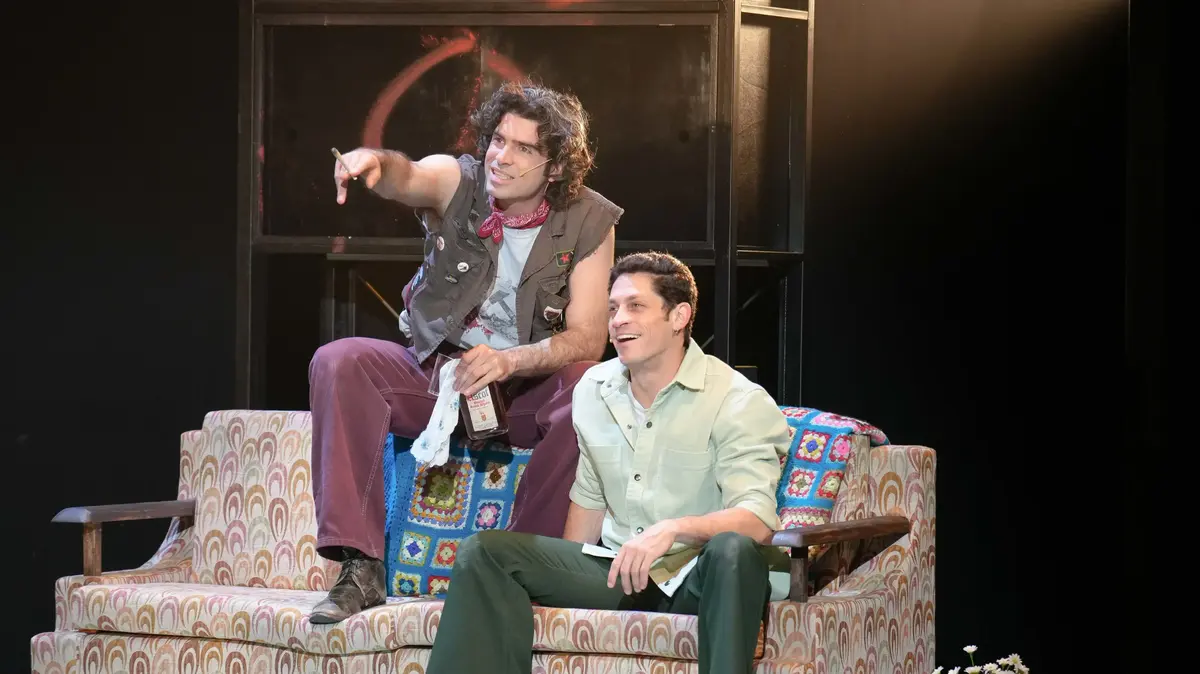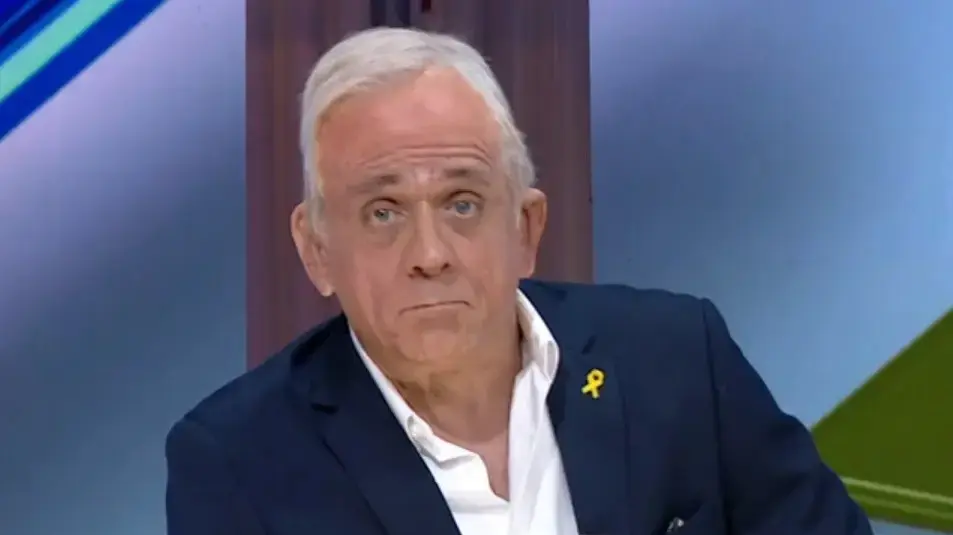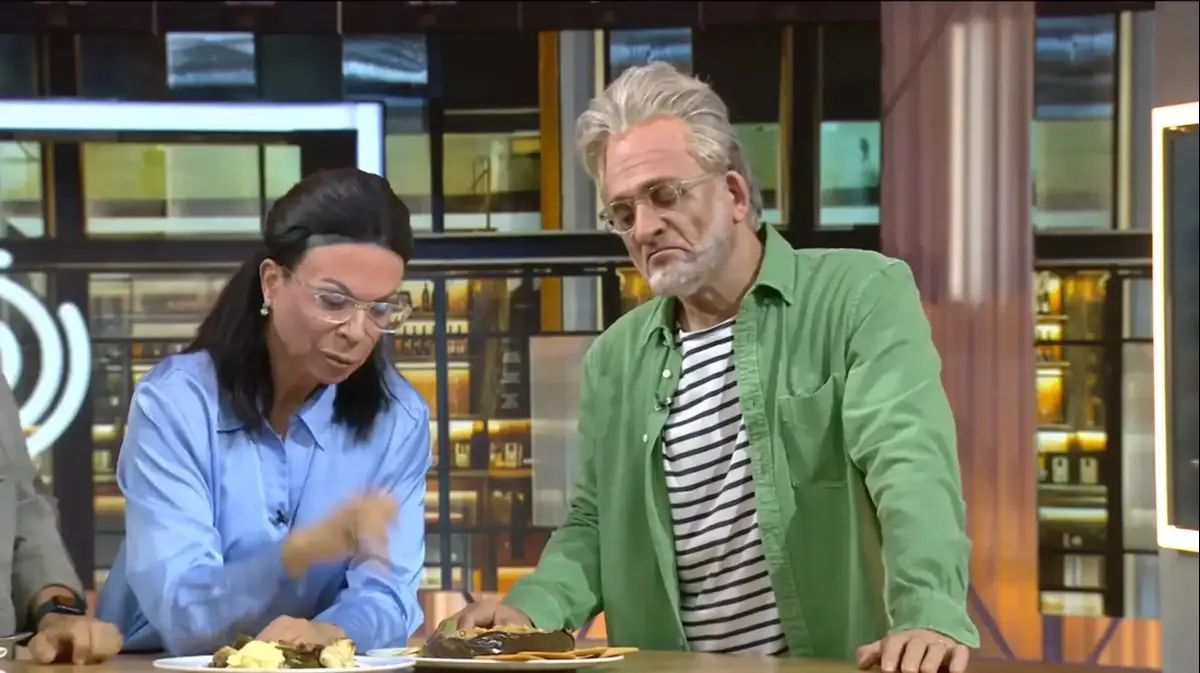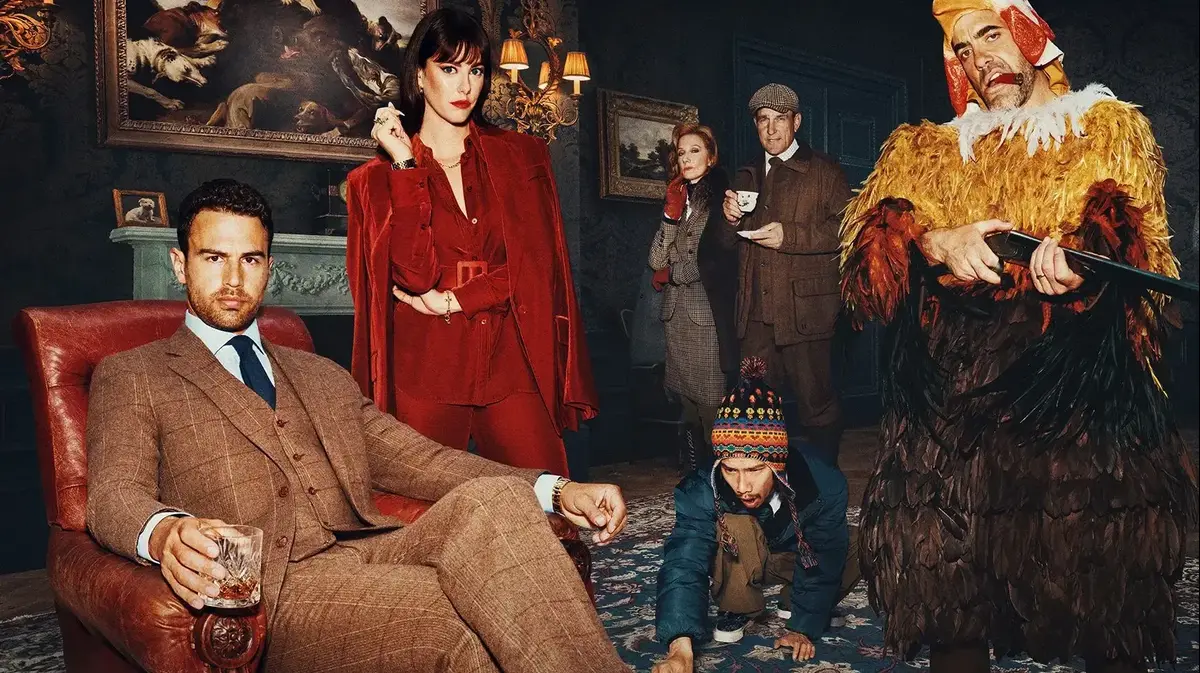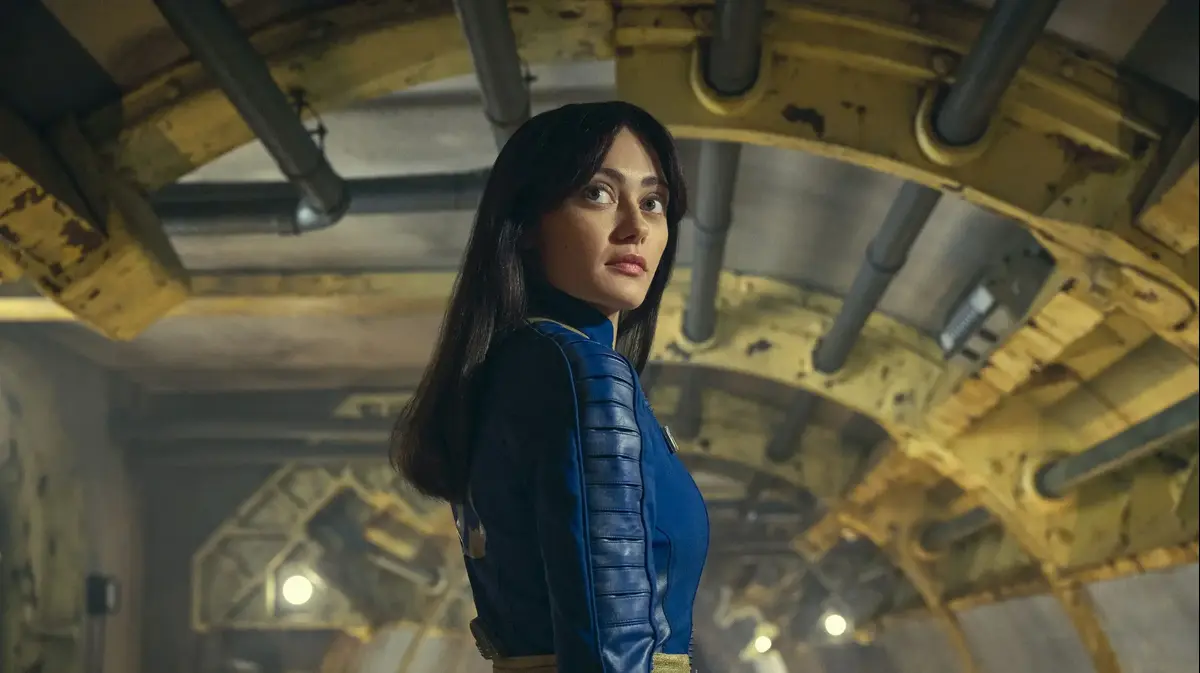The Turtles, the Philos and the Bloggers: the great original characters of "Amazing Country"
"Wonderland" has just entered its 20th season, a great opportunity to go back in time and review the 20 original characters that she and her people created.
Reuven and Esti, Irena, the Romanians, Lehia Hashtag, the Turtles and the Filos: they all articulated exactly the relevant Israeliness of that moment - and sometimes the one that is always relevant
Ido Yeshayahu, Nadav Menuhin and Amit Salonim
25/09/2022
Sunday, September 25, 2022, 00:00
Share on Facebook
Share on WhatsApp
Share on Twitter
Share by email
Share in general
Comments
Comments
Two minutes after we started to organize the list that would miraculously surpass the selection of "Wonderful Country", we realized that we had made a bitter mistake.
Why did we take on this task?
How the hell do you squeeze 19 seasons of classics into one article?
What will we focus on?
In the great imitations?
They are endless.
The funniest, poignant or brilliant sketches?
There are those in impossible quantities.
The idioms that the program invented and introduced into the language?
There are countless of them.
The wonderful music moments that the show has given us over almost two decades?
The "Come Stop Singing" corner alone from the 2007 season could feed such a list.
The more we became aware of the subject, the more accurate it became that the most accurate way to recognize the genius of "Wonderful Country", which last Wednesday launched its 20th season, is to focus on the original characters created by it and its people, ones that were mainly born in its original sketches.
More than the immediate satire on the political and political events of the day, the thing that keeps "Wonderful Land" relevant and fresh over the years is its ability to accurately articulate the relevant Israeliness of that moment.
Not only in that the skits and the main characters in them become instant classics, but also in a kind of screenshot that continues to be relevant years later.
Of course, there are also many such characters, and here too we had to argue a lot and cut the flesh.
Personalities such as Momi (Eli Finish), Liora (Tom Yaer) and Keshet Lieblich (Shani Cohen) were left out, as well as minor characters who stole the show time and time again, such as police officer Edva played by Gia Bar-Gurevich in the sketches "The Cops", Mother Rachel ( Orna Banai) in the Moscona family skits, Nissan the security guard in the mall (Udi Kagan), Avi Tanga, the first gay Mizrahi singer (Shoub Finish) and really many good ones.
Also, we started from a point of departure where above all the original characters the greatest one, the one we crowned three years ago as the character of the decade - perhaps of course, played by Assi Cohen.
So this time this list pays homage to more original characters besides maybe.
After all that hard sifting, here are the twenty best characters (or character teams) in Wonderland history.
Looking for recommendations or want to recommend new series?
Just want to talk about TV?
Join our group on Facebook,
Excavator broadcast
who does he think he is
Yaakov, "Wonderful Land" (Photo: Ortal Dahan)
Jacob, the Alain Delon family (Yron Berald)
Jacob was the last name added to this list before it was closed.
You can look for excuses as to why the character of Jacob is here.
We all know such Jacobs.
He is our best friend's father or in other cases he is our father.
A typical Israeli man, of old.
A generation away from the usual characters we see on TV with the smooth hair and toned body.
Sloppy, fat and pissed off at the TV all day.
If there is an "average Israeli", he probably resembles Jacob much more than he resembles any other character on television.
But that's not why Jacob is here.
The only reason is that we can't leave him out, simply because who do we think we are?
Alain Delon?
O O O O O O
The chapels, "Wonderful Land" (Photo: Roy Berkovich)
The chapels (Shani Cohen and Alma Zeke)
Two of the great cult characters of "Wonderful Land" of all time are inseparable from each other: Jenny and Nofer, a pair of clothing saleswomen who are bored with customers, despise them, refuse to help, and wave them off just after paying.
Or in other words: "Mmm... Bye".
In a country that is obsessed with shopping, the world of the mall - and other service providers - has over the years brought out some great figures from "Wonderful Land" (Selma, for example). shirts while moving and buzzing Kasha's huge hit, and inspired countless parodies.
But beyond this entertainment, and despite the vices and hypocrisy inherent in them, the chapels were liked by the viewers because they well portrayed the distrust between consumers and the chains and the feeling that no one wants your best, alongside an expression of a very Israeli trait: it doesn't matter what you work for or how low you are on the food chain of capitalism - in your kingdom, a clothing store in this case, you are the ones who rule, decide the laws, choose what is the best outlet and determine who is allowed to touch the folds.
And if you give the kingship of this extension, you are only asked to dance.
Bubbles waiting to burst.
Nadir Akerman, "Wonderful Country" (Photo: Keshet 12)
Nadir Akerman (Udi Kagan)
In the 2021 season of "Wonderful Country", at the stage when Israeli society began to understand that those who do not work in high tech will have difficulty existing with respect in this place, the team of the high tech company "Wobos" was the distilled embodiment of the unattainable.
The rich and hedonistic society included the archetypes required in such an office: the Russian introverted genius programmer, the over-aged worker who fears for his place and pretends to be young, and so on.
Above them all, in every sense, was the boss.
Our introduction to Nadir was made through the character of Golan (Tamir Bar), a clueless person without education and training who managed to infiltrate the company because he made up nonsense in a job interview and no one bothered to check him.
This is exactly the warm air on which "Vobus" floated until the oxygen there ran out, complacent and casual behavior in the image of the man who founded the company.
Udi Kagan has made a career out of characters whose connection to reality is very little, and Nadir Akerman is of course no different.
Even if the hi-tech skits were the extremism of a real and perhaps marginal niche in the field, bubbles waiting to burst, their power lies in the detached character, lifted from the people, of Nadir Akerman.
Sprawled on Olympus, devoid of any connection to the mundane world's troubles such as the need to pay off a mortgage or even manage to buy a house.
His company provided the employees with all the indulgences, and for the investors it produced a product empty of content and need.
When this adventure came to its inevitable end, the boss landed lightly on his feet without really caring what happened to his employees.
Sounds right.
More in Walla!
time maybe
To the full article
Nuances of new immigrant children.
Roy/Yuri, "Wonderful Land" (Photo: screenshot, Keshet 12)
Yuri/Roi (Mariano Idelman)
"May's blog", which was actually a vlog, does look very old-fashioned these days.
However, given that it came shortly before an entire generation developed an obsession with self-documenting on Instagram and TikTok, the series of sketches from the fifth season of "Wonderland" was almost prophetic: three girls (two of whom are played by men since Alma Zack was then the only cast member) the cameras regularly their vacation lives through the computer camera for all to see.
This was probably the first time that the youth were represented in "Wonderful Land", a trend that will continue from then until today with other excellent characters such as Keshet Lieblich and Stav Raul (A.A.), as well as well-forgotten characters such as Little Maatuk.
Beyond their pioneering, the girls of "May's blog" are not really remembered, except maybe a bit of the rejected Shipship played by Tal Friedman.
However, every episode the girls also received an uninvited virtual visit from their friends Tamir and Roy (Yuval Samo and Mariano Idelman), who regularly stole the show.
The one did it thanks to an excellent and laugh-out-loud touch - his thin voice that always suddenly breaks into a booming bass, as happens in adolescence.
The other was a distinguished and brilliant figure.
Even after all this time, it's hard to forget him and his catchphrase, "roeeeeeeee", which may not have remained in the lexicon over the years like the common childhood "OMG", but was undoubtedly iconic in real time.
Idelman's performance is one of his finest, but Roy's greatness lies mainly in the writing.
This captured the nuances of new immigrant children, those who do not hesitate to demand their place in Israeli society, and who insist with all their might to be perceived as savants despite their obvious foreign characteristics, which include, among other things, an overly literary phase of language given to them in the studio.
The mix of lack of awareness and intransigence, turned Yuri/Roi into a funny character, but at the same time one that deserves the respect it demands.
Moriah Sarak, Great Land (Photo: screenshot, Keshet 12)
Moriah Sarak (Orena Banai)
The explosive relationship of "Wonderful Land" with settler characters is worth an article in itself.
The satire program has never softened its blows when it comes to this sector, and the results - which were not uniform in level over the years, let's put it this way - have always caused a stir among its people, in whom one can also find many shades, naturally.
The outrage is very understandable when it comes to characters like Yocanet and Rachel, two characters who are really quite shameful caricatures, but compared to them, Moriah Sarak is a completely different case.
She also raised many eyebrows, and to a certain degree of justice - her first outing was in the framework of a rather rough skit during which she presented the variety of family activities in the Jewish settlement in Hebron, all of which include the abuse and humiliation of Arabs.
But as blatant as the introductory sketch was, it didn't happen out of nowhere.
Her character was created as a direct embodiment of a real settler from the Jewish settlement in Hebron, who made headlines when she stood behind a fence, teasing her Arab neighbors and repeatedly calling them "sluts".
During those days of secession, Moriah Sarek became a symbol for the extremists among the settlers.
The gloss is already in her name (and also in the names of her children, Nakamal and Mufarel).
When they talked about acts of violence, she was there with a bright smile behind it a great darkness.
When it was necessary to fight the enemy - the Israeli army - she smeared camouflage mud on her face and then she would like it as the result of playing with her children.
When a step up in the protest actions was required, Moriah emphasized that the tires that will be burned in the demonstration in the center of the country will this time be attached to cars.
Through her laid-back approach, Moriah Sarek conveyed well the most frightening and militant approach, one based on repeated real acts of the sector's extremists.
Of course it's not pleasant to look at her.
Loser conquers.
Stav Raul (and his mother), "Wonderful Land" (Photo: screenshot, Keshet 12)
Stav Raul (Gia Baer Gurevich)
Stav Raul is a sort of late incarnation of the "May's Blog" girls mentioned above, and was created by Gia herself with her husband, Yogev Yafet, as part of their own YouTube channel.
Unlike that May, Stav lives on the screens and strives to make a name for himself as a successful and profitable YouTuber, when in fact he is quite a loser.
When he urges surfers to like and subscribe to the channel, he also asks them to say "hi" to him at school.
When he explains that he used to go to a party without knowing how to dance, he says that it ended in shaming and beyond.
He excuses the reason he doesn't have a girlfriend by saying that he is married to the content he produces.
Beyond being a distillation of today's youth, clinging to screens and his fantasies even at the expense of school (although often instead of creating content he is actually busy with pornhub, "he is already halfway there") and failing in his attempts to flourish, at least for the moment - the loserness is what makes Stav Raul a conqueror so much.
In contrast to the stars of Bnei Tishhorot skits in "Wonderful Land" over the years, this time it's a sloppy and rejected boy, the son of divorced parents who probably inherited his affinity for failure from his unsuccessful father.
In doing so, Gia created a character that manages to be both very funny and vulnerable and touching.
A local borate species.
Asher Ben Horin, "Wonderful Land" (Photo: Keshet 12)
Asher Ben Hurin (Yuval Samo)
The driver of the state, who is a freedman, is the nightmare of every taxi passenger: a tireless chatterbox, tactless, rude, talks nonsense and conducts shouting conversations on the speakerphone with all the service providers that exist.
Still, Yuval Samo's greatest character is also one of the most beloved in the history of a great country: his brilliant sophistry and especially his rage against the establishment make him a popular hero, almost a modern Don Quixote, whose big mouth is his only weapon against the windmills of the world.
Some of the highlights of the skits starring him are the bitter conversations he has with his wife Hani and his mother-in-law Hadva, in which he makes sure to make it clear how much he suffers every second, while in the background the passenger in the back is holding back from bursting out laughing or from embarrassment.
It seems that there is no Israeli who does not know how to imitate the exact sound of their conversations.
But between a conversation with a service provider and an argument with Hani, who also manages to do something much bigger: without filters or political correctness and in an innocent and supposedly friendly conversation, like a kind of local Borat, he manages to peel off the armor from his passengers, and reveal the Israeli face beneath all the masks and Which is not usually said openly, even when it is not so pleasant.
This is what makes each of his trips unforgettable.
They conquered the country with justice.
The tortillas, "Wonderful Country" (Photo: Yaron Shilon)
Sapir Turtle (Alma Zak)
Along with many other characters, the turtles appeared in the first episode of a series of sketches designed to deal with a handful of people.
Yoram Kapitolnik's character, imported from Teicher Vezrahovich's radio show, was the main character at first, but then, just as Shauli stole the show in the first skit with his participation, Assi Cohen did it again.
It's hard not to admire the character of Chai Tortel, but to say another character of Cohen - it's the oboist.
The fact that Alma Zak steals the show for the show stealer is the thing that needs to be addressed.
Her Sapphire Turtle is an example of a character that was good on paper but was upgraded to something wonderful thanks to Zeke.
The skit about the eye-popping nouveau riches, another ugly segment of Israelis that "Amazing Land" is so good at describing in its various and funny shades, became in the hands of Cohen and Zeke something that conquered the country, and with full justice.
Both of them are indeed geniuses in the way they created the couple, but in the little that Zeke had in that first sketch, she came up with Sapir's very specific laugh, with her leaning back, her tongue between her teeth and clapping her hands, and a moment later she already moved her hair back, another movement that became a hallmark .
The small papers she applied to Sapir's character made her the secret asset of these sketches, the one that breathes life and character into them.
This is not even the only time - she will do it again alongside Cohen also as Merav Kopel, the disgruntled sister of the mayor of Ramat Hod.
If we had a place in the parade she would be in too.
Esti (Liat Har Lev)
The testimony to the great power of the corner "Almost Shabbat Shalom" from the 13th season, a parody of the heritage programs that are broadcast on the various channels on Shabbat evenings, is that it placed two characters in its center, and both of them completely stand on their own, in contrast to chapels or novels, for example.
One of these two characters was already familiar to us, and the other is completely new.
We will talk about Reuven later, but Esti was the epitome of the "strengthening" ones, one of whose feet is still in the world of iniquity.
A good seeker who constantly calls out to the Father in heaven, and at the same time finds it difficult to free herself from the pleasure of sin.
This inherent ambivalence made her a particularly captivating character, especially since everything about her was imbued with genuine, wide-eyed intent.
Even her sins were good-hearted, ones that are mostly related to parties and the pleasures of the body.
That's why it was hard not to love Esti and hope that she would find her perfect place in the world, no matter which side of the veil.
This is probably also why the culmination of this corner brought her, in a natural way, to these regions.
She, what was it?
At the end of that season, "Almost Shabbat Shalom" came to an end with the journey of "Wedding Delays" in which she met Esti Chassid in Russelov with whom she fell in love at first sight, and vice versa, and in the final episode the two Kebal married Ada in a festive and joyful skit, including a performance by Dedi Dadon.
In a country that is becoming more and more pious, Esti and Reuven were the warm faces of the trend of repentance.
She was a media pioneer.
Lehia Hashtag, "Great Country" (Photo: Michal Efrati)
Liya Hashtag (Liat Har Lev)
Hipsters also deserve representation, and if anything - accept the unfortunate Leah Hashtag in her brilliant as always portrayal of Har Lev.
The haughty gadget reporter, who watches and buys and does all the most correct and up-to-date things but - cut to three hours ahead - everything falls apart for her when she meets the real world, the fact that she is in it but she has no skills to understand.
die.
Leahia is the hipster tragedy incarnate: the huge gap between the world she aspires to and the humiliating villain she falls into again and again is almost touching.
No matter how much you despise provincialism and snobbery - Mrs. Hashtag is doomed to discover time and time again that she is, after all, an Israeli looking for love, companionship and acceptance.
Whatever you do: her hand is always on the bottom.
The world mocks her slip existence.
The type that the hashtag represents may have disappeared a bit from the map, but it is interesting to think that she was actually also a media pioneer, and preceded an era where what happens on social networks is not only the talk of the day, but the agenda itself.
If she were to stumble upon a random current affairs show in 2022, she would probably be shocked by the superficiality - and at the same time fit in just fine.
appeals to your heart.
Shimi Hershkowitz and the Filos, "A Wonderful Country" (Photo: Eldad Refali)
Shimi Hershkovitz (Esi Cohen)
Returning to the old sketches of "The Levels" raises a slight cringe sensation.
Something about the lack of sophistication in the decision to produce a weekly skit based on "the ugly Israeli" does not really stand the test of time.
Filos of Mariano, a kind of updated version of all the oriental characters that Gebry Banai made in "The Pale Tracker", is a beastly character, stupid and disrespectful to others.
You can find 100 of these on every road in Israel at any hour of the day.
But the center of those skits were the Hershkovich couple, with the Ashkenazi name that is supposed to make everything less racist.
It's hard to ignore some tongue-in-cheek words invented by Assi Cohen as Shimi, such as "I turn to your heart" or "I'm sick of it".
It's even harder to ignore that these sketches were ahead of reality with "The Chocolate Flight" or "Amal'a, how beautiful I am" - after all, what are they if not realistic pieces of leveling?
It's hard to say that Shimi's character is easy to love.
He's funny, very funny sometimes, but he doesn't have an iota of kindness in him.
Like the bullies who will overtake you in line tomorrow and yell at you if you wake them up, Shimi is a bully.
Compared to perhaps, its deeper incarnation, it is impossible to find sophistication, institutional defiance or independent thought.
Shimi is here on the list thanks to the tongue twisters he introduced into the language, and despite the fact that he represents everything that is terrible in the human capital of this nation.
The really strong parody.
Kimmel Pear, "Wonderful Country" (Photo: Ram Shani)
Caraway pear (Tom Yaer)
In the opening episode of the new season of "Wonderful Land" the panel presented a triple parody on the three leading pop singers in Israel - Nono, Anna Zak and Noa Kirel.
The song was cute, the imitations were great but the parody was lost.
It mainly threw us back to the days when Tom Yaer presented her version of Noa Kirel - Kimmel Pear.
While there was no doubt that Kimmel was a parody of Noa Kirel, the choice to give her a different name was the right decision.
The creators of "Eretz" and Yaer herself did not seek to direct the arrows of satire at the young singer at the time, but at the industry that nurtures her.
Kimmel, like Kirel, was portrayed as a victim of a pushy family (Grandma Kimmel) and publicists who made even her love life part of the business.
Along the way, we were treated to some heartbreaking songs like "Look for me in the first place", and especially "I'm illegal" - perhaps the strongest satire on the pop world written here with lines like "I'm illegal, I don't take boosters, I buy views for a music video from a Turkish company".
Everything is here, including criticism of the people who consume this shit, not to mention those who let their children ("the ones who can be fed anything") consume it.
Showed the racism built into our society.
Selma, "Wonderful Country" (Photo: Nofer Yoren)
Selma (Liat Har Lev)
The character of the pharmacist Selma ("like the actress Salma Hayek") has become the big heart that was once the focus of the excellent mall skit series of "Great Country".
Next to the security guard of Udi Kagan and the Bukhro-Persian food seller "Khurshinzad" by Assi Cohen, Selma gave us a unique and fresh viewing angle for the well-known Israeli archetype - the "good Arab".
The one you can't do without.
It's that the ugly Israeli knows how to enjoy his services, but still can't ignore his accent.
Selma got a life of her own even outside of "Wonderland", when she became a regular character in the cult show "Michael".
There too, as in the sketches of "Artez", Har Lev manages to flirt with a smile in the space between "Black Face" and a loving homage to the neighboring culture, while making a deep satirical wink at Israeli hypocrisy.
Through Selma's eyes we see the racism built into our society, such as customers who prefer to get their prescriptions from a Jewish pharmacist instead - and also the beauty that is revealed when ordinary people manage to rise above this racism, and even fall in love.
Under today's strict PC rules, it is hard to believe that another character like Selma could be created, certainly not by a Jewish actress, which is a shame.
of the absurd and witty.
The novels, "A great country" (Photo: Ava Gaz)
The Romanian workers (Tal Friedman, Eli Finish and Dov Navon)
Gotta Mortza Israel!
One of the most absurd hallucinations in the history of "Wonderful Land" is the morning show of Moshi, Yanko and Uzzi, Romanian workers with a legal visa who mediate through the television screen, in a completely invented Romanian, the absurd Israeli reality - with wonderful dances, kebabs, and of course the ultimate mascot: the Koritza hen.
The gang created an amazing language that pretends to be Romanian and actually laughs at us.
Most of it is made up of the linking words "Pecha Piche", the news is called "Koshimero", the donuts are "Clorazi", a moment is "Doodley", the music on this street is "Singolda Jabotinsky" and the commercial is "Nijusi".
It's a wild and extreme comedy, out of control, excessively happy.
That's exactly why - Supertiza!
- It is clothed with sharp satire: through the foreign and supposedly innocent eyes, the Romanians can emphasize how much they love the country ("Senita Israel!") and at the same time present politicians as
Through their joy, they illustrated through an infantile interpretation of clips from the television the phenomena of corruption, police violence and other horrors, and also presented the sad reality of the most transparent people in Israeli society, which sometimes also includes disgraceful exploitation and human trafficking.
Every skit is a hoax.
Proved that Israeliness is not a birthland.
Irena with Shaoli, "a great country" (photo: Michal Efrati)
Irena (Liat Harlev)
כאמור, בדיוק לפני שלוש שנים בחרנו את דמותו של שאולי לדמות העשור של וואלה! תרבות, וזו גם הסיבה שדווקא שמו של אחת הדמויות הכי מבריקות שפרצו ב"ארץ נהדרת" נעדרת מהרשימה הזאת. מי שכן אפשר למצוא ברשימה הם אחיו ראובן (בהמשך) וזוגתו אירנה. למען הסר ספק, לאירנה, בגילומה של ליאת הר לב, יש הרבה מניות בבחירה של שאולי לדמות העשור.
אירנה פה בגלל שהיא קנאית, ובגלל שמקנאים לה. אירנה פה בגלל שהיא חצופה, אבל רגישה למשפחה שלה. אירנה פה בגלל שהיא יודעת שהכל בולשיט ולא לוקחת הכל ברצינות - חוץ מאת הדברים החשובים לה. אירנה פה בגלל המבטא הלא ישראלי שלה, שרק מדגיש כמה שישראליות היא לא ארץ לידה, אלא התנהגות ואופי.
אירנה היא לא "העזר כנגדו" הקלאסי, אלא דמות שעומדת בפני עצמה. ובכל זאת, היא ברשימה הזאת בגלל חלקה במערכת היחסים הכי ישראלית שהציגו ב"ארץ נהדרת", ואולי בטלוויזיה הישראלית בכלל. עם כל הכבוד לפילוסים, לטורטלים וכו', שהציגו גרסאות מוגזמות של נישה ישראלית - אירנה ושאולי הציגו מערכת יחסים אוהבת אמיתית. נכון, היו שם ריבים (קורעים מצחוק בפני עצמם), אבל ההתפייסות שם הייתה אותנטית. טרו לאב יעני.
זכינו בו. דדי דדון, "ארץ נהדרת"(צילום: קשת 12)
דדי דדון (אסי כהן)
ארץ נהדרת מצטיינת בפרודיות מוזיקליות, מדריה פלג דרך קייט מארלו ועד חביב נעים - כולן דמויות שפיצחו באופן מבריק מגמות במוזיקה הישראלית, בסגנון, במילים ובהתנהלות. בין כל אלה תופס דדי דדון של אסי כהן מקום מיוחד: בתקופה שבה להיטי ענק כמו "דרך השלום", "טרמינל 3" ו"טיסה 5325" חרכו את תחנות הרדיו, כוכב הפופ המזרחי של ארץ נהדרת הגיע, לתדהמת כולם, להישגים גבוהים יותר במצעדים השנתיים עם "מתוקה מהחיים".
דדי דדון התבסס על שירים שמתארים חופשות חלומיות ורומנטיקה מתפרצת ועל זמרים עם חיוך שלא יורד מהפרצוף, וחגג עם קליפ מילולי מדהים שכולו אילוסטרציה. יחד עם זאת, הדמות שלו גם קיבלה חיים ואופי משל עצמה - פלרטטנית, טורפת את העולם, מרוכזת ומאוהבת בעצמה, כולל להיט האהבה החד-כיווני "זכית בי".
להבדיל מפרודיות גזעניות על מוזיקה מזרחית, דדי דדון הוא דמות ווינרית שאוהבת את הז'אנר שלה וחוגגת אותו. זאת הסיבה שהשירים שלו הצליחו מעל לכל הציפיות, והולידו ביקוש גובר לעוד ביצוע ועוד אחד, עם רפרטואר של שירים שעפים על החיים.
נותרה אייקון. לובה, "ארץ נהדרת"(צילום: קשת 12)
לובה (טל פרידמן)
הקופאית הרוסייה והמתולתלת בגילומו האקספרסיבי של טל פרידמן, שהופיעה כבר בפרק הבכורה של התוכנית אי אז ב-2003, היא עד היום אולי האסוציאציה הראשונה כשחושבים על "ארץ נהדרת". הריטואל שלה היה קבוע: שואלת לפי כל כללי הטקס אם יש כרטיס מועדון, אוצרת בתוכה את כל הסבלנות שבעולם, עד שהלקוח האדיש לחלוטין עושה שכונה אחת יותר מדי - וטועם את זעמה של לובה המתוסכלת, שנושאת איתה את זעמן של הקופאיות כולן - שנים לפני המלחמות בין כוכבה וטיטינסקי ב"קופה ראשית".
בתוך הכעס של לובה יש כאב אמיתי, חשש מפיטורים מעבודה בשכר מעליב ותסכול מאנשים שמזלזלים בזמן שלה ובעברית שלה. למרות זאת, הדמות הזאת לא הזדקנה היטב ונתפסת על ידי רבים כקריקטורה פוגענית וסטריאוטיפית על חשבונם של יוצאי ברית המועצות שעלו לישראל וקשיי השפה והפרנסה שהיו מנת חלקם, מזכרת מעידן נטול רגישות. מי שנועדה להמחיש את חוצפת הישראלים, היא דווקא זו שהפכה לבדיחה שלהם.
כך או כך, לובה נותרה אייקון. היא אפילו, למרבה האירוניה, הפכה לפרסומת, לרשתות סופרים כמובן. גם כיום שלל שלם ממטעמיה עדיין נמצא במילון הישראלי - מילים כמו "משלוחה" וקיצורים כמו "סדר" ו"צטערת", או ביטויים כמו "אין שפה, אין עבודה, קשה קשה" - אלה עדיין זורקים מיד לסצנה מאוד ספציפית בכיכובה של דמות מאוד ספציפית. במילים אחרות: הלקוחות המזלזלים באו והלכו, ולובה עדיין כאן.
חזקי, ארץ נהדרת(צילום: צילום מסך, קשת 12)
חזקי/ז'רום/דרורית/דובה/רוחל/שיפשיפ/יגאל/צילה/הקריין/אשת לוט (טל פרידמן)
חלק מהדמויות של טל פרידמן עומדות בפני עצמן, אבל נראה שיש משהו שמחבר בין כולן. זו הפראות הבסיסית, הלהט שאי אפשר באמת לתסרט והנונסנס הטהור שמגיע לפרידמן בכל כך טבעיות, שגם בתוך קאסט רווי בכישרון אף אחד לא באמת יכול לחקות. למעט לובה שבלטה לטוב ולרע בתחילת הדרך של התוכנית, יכולנו לבחור איזו דמות אקראית של פרידמן ולחגוג דרכה את הרב-גוניות החד-פעמית של הגאון הקומי, אבל איכשהו דווקא אצל פרידמן הבחירה הופכת לקשה כל כך.
האם זה חזקי מדריך הטיולים שמבקש "לדבר חלש" רגע לפני שהוא בעצמו מתפוצץ? ז'רום שבלבוש חלקי מאוד מבקש לעשות סנופי דיסקו בטיילת? רוחל שאוהבת את יוקנת כנגנית? קריין הפרסומות שהופך שורות כמו "אוהבים נקניקיות?" לפיסות אמנות, או אולי צילה, היחידה שמצליחה לחנך - גם אחרי עשרות שנים - את שימי ופילוס? בהיעדר בחירה מובהקת אחת, ומכיוון שאנחנו ממציאים את החוקים, פשוט דחפנו את כולם פנימה. אינעל שורלק ואחותו, האין זה מראה מרהיב?
ישתדרג שמם. ראובן ואסתי, "ארץ נהדרת"(צילום: מיכל אפרתי)
ראובן (ערן זרחוביץ')
כמה הגיוני שאחת הדמויות הגדולות של "ארץ נהדרת" שאינה שָאולי היא קרובת משפחה שלו, אחיו במקרה הזה, כפי שזכינו להכירו בספין-אוף המעולה "הפרלמנט" (ועוד קודם לכן בתוכנית של טייכר וזרחוביץ'. בדיוק כמו אירנה גם ראובן עומד לחלוטין בפני עצמו, אך בניגוד לפאוור קאפל, ראובן הרבה פחות מחוספס. למעשה, אם עשרה קבין של חספוס ירדו לעולם, תשעה לקחו שאולי ואירנה, ובמקרה הטוב הותירו אחד לאיש החייכן והטמבלול הזה.
אל "ארץ נהדרת" ראובן הגיע כבר כדמות מבוססת. דתי צנוע ולא מבריק - "אוצר סתום של ידע", כלשונו - שלמרות זאת משמש לסובביו כמעין רב ומורה דרך הלכתי לא מוסמך. ב"הפרלמנט" הוא היה דמות משנית, ובכל זאת גנב את ההצגה כל אימת שהופיע על המסך. ככזה הוא חצב לו מקום של כבוד גם ב"ארץ נהדרת". ב"כמעט שבת שלום" התגלה שפיו של ראובן מפיק ערגליות ומספק שפע של הברקות מילוליות: "ישתדרג שמו לעד", "שתזכי לנרות", "די לחכימא בקריזה", "אני הומודידקט", "ארץ אוכלת ראשיה", "אני בשוק על ירך ממך", "כל צנעתה דוך פנימה" ועוד ועוד.
אבל מעבר לפניני הלשון הבורקות האלה, במסגרת הפינה הזו ראובן הפך לדמות עגולה יותר. למדנו שהתקרבותו לחיק היהדות החלה כששכח להחזיר כיפת קרטון מהכותל ואז התקדם לאט לאט לכיפה בצבע לבן מט בדרכו לכיפה שחורה, דאן 3. את האור שחווה הוא ביקש להנחיל גם לאסתי ולכולנו. איך אפשר לסרב? ואם יש מסקנה שנובעת מכל זה, היא שחייבים עוד עונה של "הפרלמנט".
culture
TV
Israeli TV
Tags
Wonderful Country


